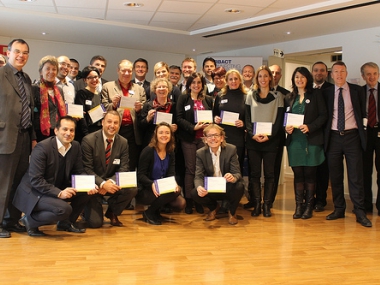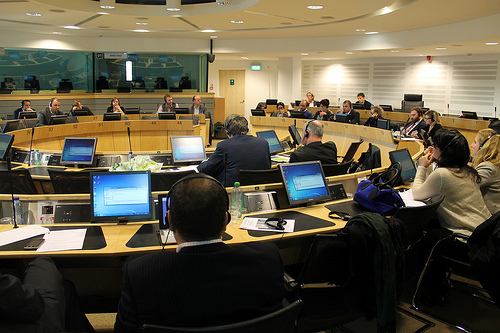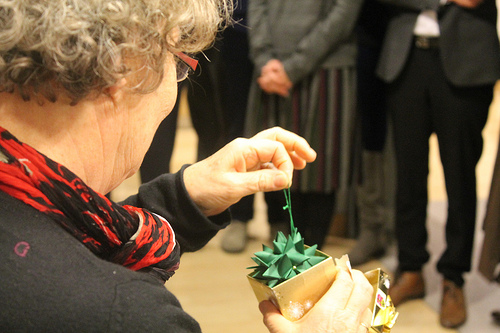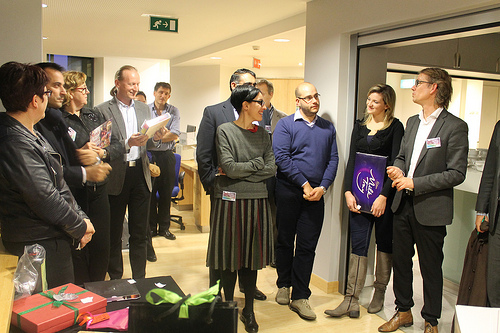Elected Representatives: A Vote of Confidence in URBACT Training
Edited on
09 October 2017City authorities across Europe are aware of the growing need to consume less energy and to reduce CO2 emissions. But how can they start the energy transition towards a cleaner, more sustainable environment? That was the challenge set by the third and final URBACT pilot training seminar for elected representatives, held on December 2 - 4 in Brussels.

Entitled ‘How to make our cities more sustainable’, the seminar reflected the earlier sessions in dealing with a key issue in urban development. The opener in April had focused on how to take an integrated approach to projects by involving different levels of the state. Its successor in September looked at ways of giving the general public a role in the development process. Though the work was often complex, the aim of all three pilot seminars was simple: to give elected representatives the background knowledge they need to become more involved in URBACT projects. Designed as a capacity-building exercise and supported by the European Commission, the sessions all shared a common structure: presentations by experts, practical exercises, peer reviews of URBACT Local Action Plans and field visits.
With each seminar lasting three days, there was also time for delegates to exchange experiences and advice on an informal basis. As Gus Hoyt, a Member of the Bristol City Cabinet, put it:
“I always came away energised and with lots of ideas - and not just from the lectures and workshops. It’s having a coffee with a representative from Norway, for example, and finding out their approach to projects or how they are tackling problems. The fact that we’re all elected representatives also means the conversations are different to what they would be with other stakeholders back in our cities.”
Birmingham (Creative SpIN), Budapest (RE-Block), Trieste (USEAct), Suceava (URBACT Markets), Cesena (JOBTOWN) and Lublin (EUnivercities) all came under the spotlight. Lublin Councillor Beata Stepaniuk highlighted the value of such exchanges. “After my presentation, people gave me a lot of suggestions as to how to keep this student talent in my city. But I also learned a lot about sustainable development and realised we really must have a strategy for this in our cities.” That idea of city leaders taking responsibility for energy transition was the theme of a presentation about the work of the Covenant of Mayors, whose members aim to exceed the EU’s CO2 reduction target by 2020. Gérard Magnin, Executive Director of Energy Cities, a local authority association that leads the Covenant, told his audience: “Investing, so as to consume less, isn’t a technical question. It’s a question about the society we want to live in. It’s about the choice between renewable and fossil fuel energy, between living in harmony with nature and being a predator of nature.”

Riga (USER), Bristol (Sustainable Food in Urban Communities), Ourense (Sustainable Food in Urban Communities) and Avilés (JOBTOWN), the major seminar work continued with a session on the theory and practice of energy transition management. Led by Derk Loorbach, Director of DRIFT (Dutch Research Institute on Transitions), an introduction to the basic principles was followed by a group exercise that involved delegates planning three different transitions (economic, energy & mobility, and new lifestyles). As Françoise Rivoire, Deputy Mayor of Lyon, underlined: “The energy transition is a real challenge for the future, and we need to find solutions for this.”
 www.covenantofmayors.eu www.energy-cities.eu sustainablecitiescollective.com www.sustainablecities.eu www.c40cities.org
www.covenantofmayors.eu www.energy-cities.eu sustainablecitiescollective.com www.sustainablecities.eu www.c40cities.org
Find all the presentations from session 3 on :
http://www.slideshare.net/URBACT/presentations
Facts & Figures
- Cities account for 70-80% of greenhouse gas emissions related to human activity.
Source: Presentation by Professor Harald Roracher, Linkoping University, Sweden, to URBACT Pilot Training for Elected Representatives, Dec 2-4, 2013
- In terms of size, cities occupy only 2% of the world’s landmass. But they consume over two-thirds of the world’s energy and account for more than 70% of global CO2 emissions. And with 90% of the world’s urban areas situated on coastlines, cities are at high risk from some of the devastating impacts of climate change, such as rising sea levels and coastal storms.
Source: http://www.c40cities.org
Quotes
• “You get a lot of ideas at an URBACT training session and you get very enthusiastic.”
Akos Hegyi, Pecs, URBACT Markets
• “I always come away from a seminar with lots of ideas… It’s very enlightening and always leaves you very energized. I was involved anyway, but they have ensured that I’m thoroughly involved. And they’ve helped me realise just how important it is to work with other European cities.”
Gus Hoyt, Bristol, Sustainable Food
• “After the three sessions, I feel more on top of things and also more inspired… it makes you realise that all cities around Europe are facing the same issues and trying to solve them; and that if we get together and think together, maybe they will be easier to solve.”
Vedgren André Just, Copenhagen, USER
• “All three sessions was a great opportunity to meet politicians from many European countries and get to know their views. The countries are different but the problems are generally the same.”
Beata Stepaniuk, Lublin, Euniversities
Submitted by admin on

